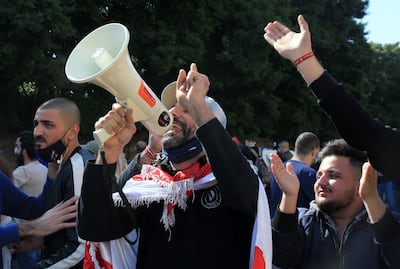Security forces cracked down on demonstrators in Tripoli after deadly protests resulted in the torching of the municipality building last month.
Lawyers acting for the detained told The National that 24 people have been arrested since January 31, in conditions they describe as unlawful.
They say the detained were not allowed to contact a lawyer prior to their interrogation or inform their family of their arrest and that at least two of them had been beaten.

Authorities deny the allegations and say they arrested people suspected of torching government buildings and attacking members of the security forces.
Alaa Hussein, 29, is a political activist who was in the custody of army intelligence for five days. His brother, Bilal, said authorities did not inform the family of his whereabouts or why he had been detained.
“At first we didn’t even know what happened to Alaa. We had to use our connections to find out he was detained by the army,” Bilal said. “All these people were arrested in a mafioso way.”
In the last week of January, Tripolitans took to the streets to protest against poverty and a lack of financial support from the government during a strict 25-day coronavirus lockdown.
The demonstrations turned violent when protesters tried to storm the Tripoli Serail, the seat of the local government. The municipality building was set alight that week after a protester was shot dead by the Internal Security Forces, which admitted live ammunition had been used “in self-defence”.
An army intelligence source told The National that those detained are suspected of having taken part in violent acts.
But activists and lawyers believe many are being unlawfully detained. The arrests sparked small protests in Beirut and Tripoli and fuelled further distrust of authorities.
Dozens of protesters gathered in front of Tripoli's Justice Palace last Thursday to demand their release.
Hilal Bodon, 41, said he believed authorities were trying to repress the protest movement by resorting to arbitrary arrests.
"Many of the people who were arrested in Tripoli are influential in the protest movement, but they are not the ones who burnt down government buildings," the activist told The National.
The army said it had arrested 27 people in relation to the rioting in Tripoli.
The Internal Security Forces did not disclose any arrests and could not be reached for comment. Lawyers told The National that more than 40 people were arrested by the army and security forces and 24 were still detained.
Ali Abbas, a lawyer to some of the detainees and activist at the Popular Observatory to Fight Corruption told The National that among the 24 detained only two have been released this week. Fifteen of them were formally charged with at least one of the following: rioting, forming a gang and assaulting security forces. They are set to appear before a military court. The remaining detainees should know whether they will be charged or released on Friday.
"They are essentially trying to silence protesters," Mr Abbas said.
The Popular Observatory to Fight Corruption has called for the immediate release of the protesters and has been holding regular demonstrations in front of the Military Tribunal in Beirut.
Mohamed Sablouh, a lawyer, filed a complaint with the General Prosecutor for the enforced disappearance and unlawful detention of at least 25 demonstrators, including two minors.
“Detainees have a right to call their families and to access a lawyer. They are being denied this right,” he said.
Mr Sablouh said he also had evidence that two demonstrators were beaten by security forces.
“We are fighting for authorities to simply follow the law. Unfortunately, legislation remains ink on paper.”
Two army sources denied the allegations.
Mr Sablouh said that although the law was recently amended to allow a lawyer to be present during questioning, he was surprised when authorities informed him that most of those detained had waived their right to that.
An army representative told The National they were not bound by law to have a lawyer present during questioning.
"This is a new amendment to the law that has not been put into practice yet," he said.
The Tripoli Bar Association, of which Mr Sablouh is a member, plans to file a petition to the government next week to lobby for the rights of detainees to be respected.









